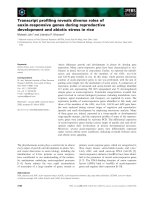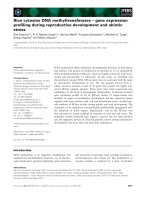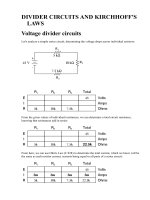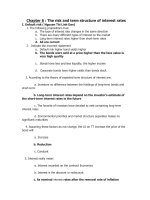Chapter 6 career development and work stress
Bạn đang xem bản rút gọn của tài liệu. Xem và tải ngay bản đầy đủ của tài liệu tại đây (343.48 KB, 16 trang )
Organizational Behavior: An
Experiential Approach 7/E
Joyce S. Osland, David A. Kolb,
and Irwin M. Rubin
1
©2001 by Prentice Hall,
Inc.
Chapter 6
Organizational Behavior: An
Experiential Approach 7/E
Joyce S. Osland, David A. Kolb,
and Irwin M. Rubin
2
©2001 by Prentice Hall,
Inc.
Objectives
•
Describe the characteristics of adult development
•
Explain Levinson’s concept of life structures
•
Recognize career anchors and their significance
•
Describe the functions that mentors perform
•
Identify trends in career management and planning
•
Explain the transactional model of career stress
•
Assess your current life-career situation and
develop a plan for the future
Organizational Behavior: An
Experiential Approach 7/E
Joyce S. Osland, David A. Kolb,
and Irwin M. Rubin
3
©2001 by Prentice Hall,
Inc.
Career Anchors
Security and Stability
Creativity/ Entrepreneurship
Technical/ Functional Competence
Managerial Competence
Organizational Behavior: An
Experiential Approach 7/E
Joyce S. Osland, David A. Kolb,
and Irwin M. Rubin
4
©2001 by Prentice Hall,
Inc.
Autonomy and Independence
…Career Anchors
Service
Pure Challenge
Lifestyle
Organizational Behavior: An
Experiential Approach 7/E
Joyce S. Osland, David A. Kolb,
and Irwin M. Rubin
5
©2001 by Prentice Hall,
Inc.
Career Functions of Mentors
•
Sponsorship
•
Exposure and visibility
•
Coaching
•
Protection
•
Challenging assignment
Organizational Behavior: An
Experiential Approach 7/E
Joyce S. Osland, David A. Kolb,
and Irwin M. Rubin
6
©2001 by Prentice Hall,
Inc.
Psychosocial Functions of
Mentors
•
Role modeling
•
Acceptance and
confirmation
•
Counseling
•
Friendship
Organizational Behavior: An
Experiential Approach 7/E
Joyce S. Osland, David A. Kolb,
and Irwin M. Rubin
7
©2001 by Prentice Hall,
Inc.
The Future
The Past The Present
Tripod of Life Plan
Perspectives
Life
Plan
Organizational Behavior: An
Experiential Approach 7/E
Joyce S. Osland, David A. Kolb,
and Irwin M. Rubin
8
©2001 by Prentice Hall,
Inc.
A Path With Heart
Resonance
Tone
Perspective
Organizational Behavior: An
Experiential Approach 7/E
Joyce S. Osland, David A. Kolb,
and Irwin M. Rubin
9
©2001 by Prentice Hall,
Inc.
The New “Protean” Career
Contract
•
Career managed by person, not
organization
•
Career as lifelong series of
experiences, skills, learnings,
transitions, and identity changes
•
Development is continuous learning,
self-directed, relational, and found in
work challenges
Organizational Behavior: An
Experiential Approach 7/E
Joyce S. Osland, David A. Kolb,
and Irwin M. Rubin
10
©2001 by Prentice Hall,
Inc.
Ingredients for Career
Success
To learn-how
To employability
To protean careers
To whole self
From know-how
From job security
From organizational
careers
From “work self”
Organizational Behavior: An
Experiential Approach 7/E
Joyce S. Osland, David A. Kolb,
and Irwin M. Rubin
11
©2001 by Prentice Hall,
Inc.
The New “Protean” Career
Contract
The organization provides:
Challenging assignments
Development relationships
Information and other developmental
resources
The goal: psychological success
Organizational Behavior: An
Experiential Approach 7/E
Joyce S. Osland, David A. Kolb,
and Irwin M. Rubin
12
©2001 by Prentice Hall,
Inc.
Major Causes of Stress
•
Change
•
Lack of control
•
High workload
Organizational Behavior: An
Experiential Approach 7/E
Joyce S. Osland, David A. Kolb,
and Irwin M. Rubin
13
©2001 by Prentice Hall,
Inc.
COSTS OF STRESS?
•
Decreased job satisfaction
•
Decreased job performance
•
Increased absenteeism
•
Increased alcohol and drug abuse
•
Increased illness
Organizational Behavior: An
Experiential Approach 7/E
Joyce S. Osland, David A. Kolb,
and Irwin M. Rubin
14
©2001 by Prentice Hall,
Inc.
Transactional Model of Career
Stress
Organizational Behavior: An
Experiential Approach 7/E
Joyce S. Osland, David A. Kolb,
and Irwin M. Rubin
15
©2001 by Prentice Hall,
Inc.
Dynamics of Work Stress
Intrinsic to the Job
Role in the
Organization
Relationships at Work
Career Development
Organizational
Structure and Climate
Nonwork Factors
Sources Of Stress DiseaseSymptoms Of Stress
Individual Symptoms
Raised Blood Pressure
Depressed Mood
Excessive Drinking
Irritability
Chest Pains
Organizational Symptoms
High Absenteeism
High Labor Turnover
Industrial Relations
Difficulties
Poor Quality Control
Coronary
Heart
Disease
Mental
Illness
Prolonged
Strikes
Frequent
and
Severe
Accidents
Apathy
Individual
Organizational Behavior: An
Experiential Approach 7/E
Joyce S. Osland, David A. Kolb,
and Irwin M. Rubin
16
©2001 by Prentice Hall,
Inc.
TYPES OF COPING
•
Direct action – remove the stressor by
changing the situation
•
Cognitive reappraisal – change the way
we think about the stressor or situation
•
Symptom management – treat the
stress reaction via exercise, meditation,









